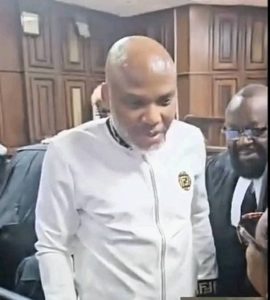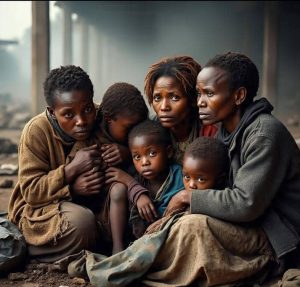It was painful watching Soyinka speak like an INEC spokesman
By Azuka Onwuka
It was painful, embarrassing and heartbreaking watching Nobel Laureate, Prof. Wole Soyinka, speak on the Nigerian election last week. He sounded like a top member of the All Progressives Congress or spokesperson of the Independent National Electoral Commission defending the 2023 election. The Soyinka I watched and listened to didn’t sound like the Wole Soyinka of the 1960s, 70s, 80s, 90s and early 2000s. He did not sound disinterested, detached or dispassionate. It was like watching a revered masked spirit in the mould of Ajofia or Ijele unmasking himself in public and running around with children at the market square. Like our people say, when a relative is dancing badly at a public event, one keeps experiencing an itchy feeling on the eyelashes.
When I saw clips of Soyinka’s recent comments about the 2023 election, I decided to search for the full interview online. Sadly, what I saw were still the same clips and other old interviews. I needed to watch his new interview in full to hear all he said and the context. I then made a post about it, and luckily Prof. Okey Ndibe, who interviewed Soyinka at the Stellenbosch University event in South Africa, attached the YouTube link of the interview and I took time to watch it. It was a video of one hour, 44 minutes and 20 seconds.
In the interview, Ndibe asked him many questions. Soyinka, who never pulls his verbal punches against his opponents, called Donald Trump “that criminal” and called Joseph Stalin “the arch-criminal.” Towards the end of the interview, Ndibe asked him about the 2023 election in Nigeria. Ndibe said that some people had expressed their surprise that someone like Soyinka who took a gun into a radio house to stop the announcement of an election should call a candidate “fascistic” because he asked that the 2023 election result should not be used to install a president because that would breach the Constitution.
Soyinka responded by saying that he had remained consistent in standing by the truth. He alleged that the Labour Party took over the labour movement and turned it into a regional party. He said with emphasis that Peter Obi did not win the election, that he could say categorically that Obi’s party came third, not even second, and that the leadership of LP knew it but wanted to engage in what the Yoruba call “gbajue” (deceit or the force of lies). He alleged that LP leaders were going to send young people into the streets to demonstrate, and that without knowing it, LP was being used by some generals to install an interim government and bring back the military even before the election began. He noted that he had earlier sent three emissaries to the leader of LP to tell him to restrain his supporters to stop threatening and intimidating people. He added that he had to stop them from sending the youths to the streets to be slaughtered for a lie because he found that most unacceptable.
Soyinka followed up the interview with a personally signed press statement titled, “The Cape Town Re-entry,” in which he said, among other things: “Barring such abrupt ‘patriotic intervention’, however, the last word belongs to the Supreme Court. Until that conclusive hour, wherever and whenever the subject turns to the Nigerian elections, my contribution can be taken for granted in advance: Peter Obi did not win the Nigerian 2023 elections.”
It just seems that most of the interventions Soyinka has made on the Nigerian 2023 election have been focused on the Labour Party and Peter Obi. Curiously, this is the same pair he has repeatedly said came third. Alhaji Atiku Abubakar and the Peoples Democratic Party – who were declared second in that election – rarely get his attention. When they do, it is as a footnote.
First, the allegation by Soyinka that the Labour Party turned into a regional party runs completely against the truth Soyinka says he stands for. The purpose of that statement was merely to tribalize the party – a typical example of giving a dog a bad name to justify the desire to hang it. What is a regional party? A regional party is one that operates from a region mainly for the interest of that region. Labour Party was registered as a national party but could not win an election in any state until when Dr. Olusegun Mimiko decamped from the PDP to LP to win the 2007 gubernatorial election in Ondo State. He eventually left the LP and returned to the PDP.
LP remained a party with which nobody reckoned in Nigeria until last year when Peter Obi left the PDP and was elected its presidential candidate. At this year’s presidential election, despite the election’s lack of transparency, LP won Lagos State, which is in the South-West, the state with the largest number of voters in Nigeria and former capital of Nigeria. Note that Lagos State is the home state of Bola Tinubu, the APC presidential candidate and current president of Nigeria. Note also that since 1999 when the Fourth Republic began, it had been a tall order to defeat any candidate supported by Tinubu in Lagos. So, imagine Tinubu himself being the presidential candidate and then beaten by Peter Obi and the Labour Party in Lagos State.
But LP did not only record such a success in Lagos. It recorded even bigger success in Abuja, the Federal Capital Territory. LP did not just win the FCT overwhelmingly, the party made the two top parties of Nigeria not to secure 25 percent of votes in Abuja – the first time such happened to the two top parties since the start of the Fourth Republic. In winning Abuja, Obi won all nine polling units at the Presidential Villa despite that Muhammadu Buhari of the APC was the sitting president and Tinubu was the party’s candidate. In addition, LP won Plateau State and Nasarawa State in the North-Central and ran neck and neck with APC in Benue State. It won Edo, Cross River, and Delta states in the South-South and also won the five states of the South-East.
During the campaign period, while Tinubu said publicly that it was the turn of the Yoruba people to rule and Atiku said publicly that northerners should not vote for an Igbo or a Yoruba but for only a Northerner, Obi constantly campaigned that nobody should vote for him based on ethnicity, religion, party, or because it was the turn of the Igbo or any region but based on competence, character, capacity and compassion.
Given that Soyinka is a professor of English and Nobel Laureate, who perfectly understands the meaning of the word “regional,” what parameters did he then use to claim that the Labour Party was turned into a regional party?
In 1979, Soyinka joined partisan politics and chose the People’s Redemption Party of Mallam Aminu Kano, which won elections only in Kano State. As a little boy growing up in the South-East, I didn’t see a single poster of PRP or hear any jingle of the party on radio. My discussions with other people from the South-South, South-West, North-Central and North-East about PRP showed too that PRP was largely unknown in their zones. PRP scored 0.31 percent of the votes cast in Soyinka’s home state of Ogun. Yet, Soyinka found it noble to be in that party and never branded it a regional party, while an LP that performed this well in its first major outing is termed a regional party in the new Soyinka Dictionary of Contemporary English!
On his repeated claim of Obi not winning the election, that is not the primary issue in the 2023 election. The core issue in the 2023 Nigerian election is that the INEC made huge promises that the election would be the most transparent because of the use of electronic transmission of results but failed woefully in that, a failure that looked premeditated because the federal legislative elections conducted the same day were easily transmitted electronically. INEC ended up admitting mutilated result sheets as the final results and uploading them on its portal. The hopes of millions of young people who chose to vote for the first time because of INEC’s consistent promises were dashed, because they could not ascertain the veracity of the results declared. Every local and international observer group raised this same issue. Many of those young people who voted for the first time have vowed never to vote again because of that brazen betrayal from INEC. But Soyinka has been silent on this key issue and more concerned with who won and who did not win a discredited election and who is fascistic and who is not.
Furthermore, Soyinka said he sent three emissaries to the leader of LP to tell him to curb the verbal threats of his nameless supporters on social media. But the same Soyinka did not tell us if he sent a private or public message to the leader of APC when his campaign officials and allies like Bayo Onanuga, Femi Fani-Kayode, and Festus Keyamo (as well as MC Oluomo) were issuing ethnic threats, hate messages and incitement. The Nobel Laureate also did not say anything over the actual state-endorsed intimidation and attacks that took place in states like Lagos, Rivers and Kogi where APC was desperate to win by all means.
Given that Soyinka can vouch for the results of the 2023 election by unequivocally stating who won and who lost, can he – as a devotee of the Yoruba deity Ogun – hold the symbol of Ogun and swear, for example, that the result INEC recorded in favour of the APC as the winner of the presidential election in Rivers State is true? Even leaders of the APC publicly confessed that when Nyesom Wike promised them that he would deliver the state to APC, they did not believe him because they did not know how he would do it, given that APC had never won the state. But Wike eventually “did it” for APC and INEC simply accepted the result, even though everybody saw and knew how that result was procured. Tinubu eventually rewarded Wike by appointing him the Minister of the Federal Capital Territory.
At one of Tinubu’s birthday events, Soyinka had narrated how Tinubu and his wife came to his aid a number of times. He gave some examples of such assistance and said he would not disclose others. The video can easily be found online. Soyinka and Tinubu have been allies since the days of NADECO. In cases involving one’s benefactor, relative or friend, there is usually a conflict of interest. But if one wants to pronounce judgment in such cases, it is accepted as the norm that one makes full disclosure, to make such affinity clear.
The optics does not look nice to see the revered Soyinka making himself the spokesman of INEC. Neither Chief Gani Fawehinmi nor Prof. Chinua Achebe would accept to play this type of partisan role in Nigerian politics. Most Nigerians who love Nigeria are not primarily concerned about seeing their preferred candidate declared the winner. What they want is a trusted process that guarantees that elections are free, fair and transparent and that results manifestly reflect the actual votes cast. That way, power will be in the hands of the people, not in the hands of the electoral body or the judiciary. That is what makes leaders act in ways that will lead to national development.
That is why those who love Soyinka are mortified that he has repeatedly glossed over the weighty issues of the 2023 election and has been fixated on the Labour Party and Peter Obi.
At the beginning of the Stellenbosch University interview, Ndibe quoted twice from Soyinka’s book The Man Died: 1. “The man dies in all who keep silent in the face of tyranny.” 2. “Justice is the first condition of humanity.” One wishes Soyinka could reflect on his own words of yesteryears.
Copied Agunze Azuka Onwuka





